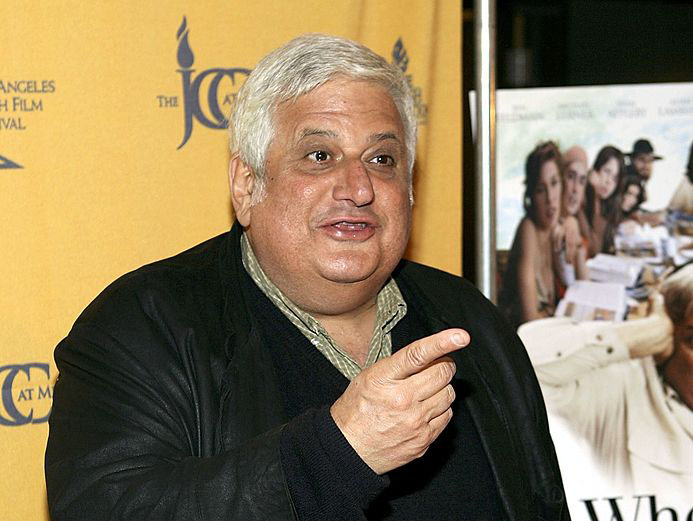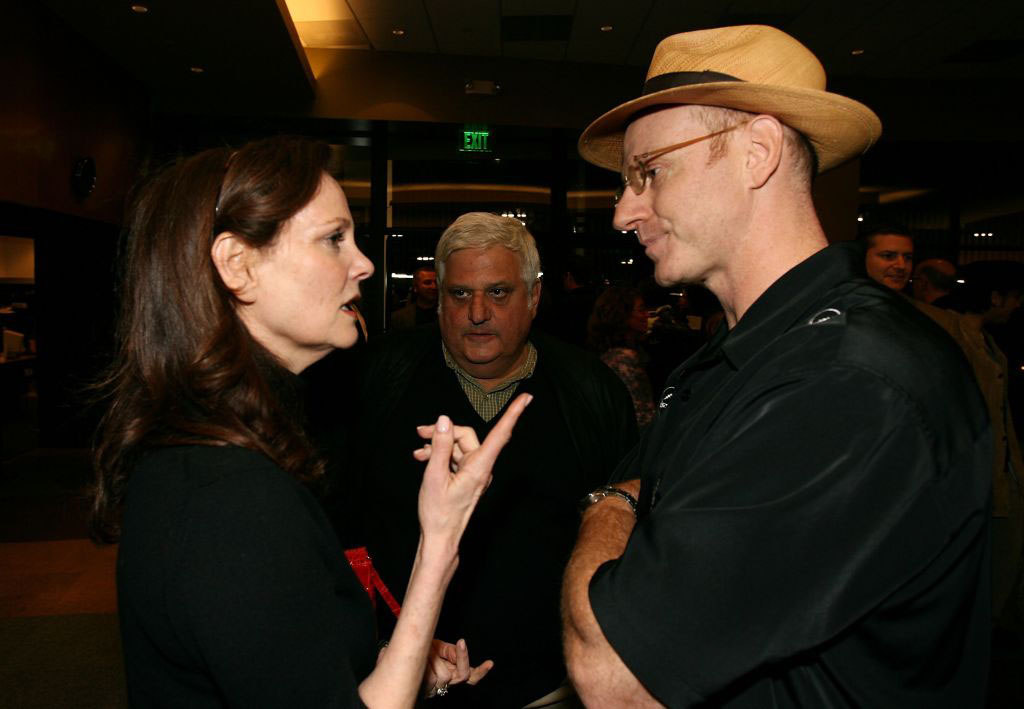 Actor Michael Lerner arrives at the premiere of “When Do We Eat?” at the Writers Guild of America on April 1, 2006 in Los Angeles, California. (Photo by Michael Buckner/Getty Images)
Actor Michael Lerner arrives at the premiere of “When Do We Eat?” at the Writers Guild of America on April 1, 2006 in Los Angeles, California. (Photo by Michael Buckner/Getty Images) The Passover comedy film “When Do We Eat?” has been a beloved tribute to the dysfunctional Seder for 18 years.
But last year, on the third night of Passover, the actor who played the family patriarch in the film, Michael Lerner, passed away at age 81. Lerner, a character actor for over 50 years, was best known for playing Jack Lipnick in the 1991 film, “Barton Fink.” For that role, Lerner earned an Academy Award nomination for Best Supporting Actor, amongst a stacked list of nominees — Ben Kingsley and Harvey Keitel for “Bugsy,” Tommy Lee Jones for “JFK” and the winner, Jack Palance for his supporting role in “City Slickers.”
In “When Do We Eat?” Lerner played Ira Stuckman, a gruff Jewish manager of a factory that produces Christmas ornaments. Not a moment in the film goes by without Stuckman accusing his family of exploiting him for “his” money. His father Arthur, depicted by the late Jack Klugman, is a Holocaust survivor who constantly carries a suitcase, prepared for the potential resurgence of Nazis. Arthur often criticizes the family for their lax adherence to Jewish traditions and is dismayed by their failure to conduct the Seder entirely in Hebrew. Additionally, there’s the daughter Nikki (played by Shiri Appleby), a sex therapist who answers work calls during the Seder. One of her brothers, Ethan (Max Greenfield), turns to Hasidic Judaism following several notable failures in business and makes inappropriate advances towards his cousin.
The film is a riot.
Not only is it a fun film, but it was also co-written by the husband-wife duo, Salvador Litvak (editor of The Journal’s Table for Five) and Nina Davidovich. The Journal reached out to them for reflections on working with Lerner during the filming.

“Michael had this wonderful ability to seamlessly transition from the grouchy father telling everybody what to do, when to do, how to do, and being in character to just slipping right out of it, telling jokes on set with us constantly, keeping it light, having fun, and then slipping right back into the character,” Litvak told the Journal. “So he was a real delight that way.”
Lerner also had a professional relationship with fellow actor Jack Klugman — they previously worked together on an episode of “The Odd Couple.”
“They had known each other for years, so they had all kinds of stories to tell,” Litvak said of the pair.
One of the lasting legacies of “When Do We Eat?” is that it helped launch the film careers of actors Max Greenfield and Ben Feldman.
“The young guys started imitating Michael and Jack on set, and at one point Michael and Jack walked up behind them and they cracked up,” Litvak said. “[Lerner and Klugman] loved that the young guys were imitating them.”
The way Lerner ended up getting the part in the film was a bit of a fluke. Litvak and Davidovich had a live-reading of the script early in the casting process — so the two of them could hear it read out loud by actors and decide if they wanted to tweak the dialogue. Their casting director, Ronnie Yeskel,knew a lot of people and put together a table read with mostly just her friends — actors coming to do their casting director friend a favor. But Lerner caught wind of the script and volunteered to participate in it. Litvak and Davidovich were astonished that the table read would feature a Hollywood veteran.
“So we heard that this Oscar nominee was just ‘coming to volunteer’ at this reading — which was really only for the writers and director,” Litvak said. “I knew who [Lerner] was, but it happened at the last minute. It was at our house and the doorbell rang, I opened the door and I was speechless for a second because [Lerner] carried himself exactly like my dad. They don’t have the same exact facial features or anything, but just a lot of similarities.”
Litvak also mentioned a few of Lerner’s lesser-known interests — he was also a vintage book dealer, and a lover of birds. Litvak and Davidovich had an African gray parrot at the time named Google and Lerner would always ask “how’s Google doing?” The last time Litvak and Davidovich saw Lerner was a few years ago when he joined Litvak and his longtime buddies at his house for a game.
When “When Do We Eat?” was released in April of 2006, it was not well-received by critics.
“The critics didn’t just pan it, but attacked it because faith is something that they’re allergic to,” Litvak said. “But over the years, ‘When Do We Eat?’ found its audience and continues to grow and has really become a cult hit. There’s just a ton of people who watch it every year. We’re very grateful for that.”
“Over the years, ‘When Do We Eat?’ found its audience and continues to grow and has really become a cult hit. There’s just a ton of people who watch it every year. We’re very grateful for that.” – Salvador Litvak
While not every Seder will be as dysfunctional (and whimsical) as the one depicted in “When Do We Eat?,” Litvak spoke about the importance of remembering those who aren’t there with us.
“The most important person at the Seder is the fifth child, who’s missing,” Litvak said. “We always talk about the four sons, but it’s the fifth child who’s not even there that we should be concerned about and try to get everyone connected because Jewish unity has never been so important as it is right now.”
Litvak also broached the topic of hosting Passover Seders this year amid the turmoil in the wake of the attacks on Israel and antisemitism around the world.
“Everybody who is Jewish wants to know what they can do for Israel and what they can do for their fellow Jewish people,” Litvak said. “Well, right now, learning a little Torah, doing a mitzvah, taking care of your fellow Jew here in your home city is something that helps the Jewish people everywhere. The more the Jews are connected to each other and to the Torah, the safer people are everywhere.”























 More news and opinions than at a Shabbat dinner, right in your inbox.
More news and opinions than at a Shabbat dinner, right in your inbox.